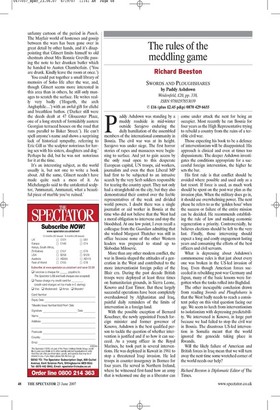The rules of the meddling game
Richard Beeston SWORDS AND PLOUGHSHARES by Paddy Ashdown Weidenfeld, £20, pp. 338, ISBN 9780297853039 © £16 (plus £2.45 p&p) 0870 429 6655 paddy Ashdown was standing by a muddy roadside in mid-winter outside Sarajevo enduring the daily humiliation of the assembled members of the international community in Bosnia. The civil war was at its height. Sarajevo was under siege. The first horror stories of rapes and massacres were beginning to surface. And yet to gain access by the only road open to this desperate European capital, UN troops, aid workers, journalists and even the then Liberal MP had first to be subjected to an intrusive search by the very Serb soldiers responsible for tearing the country apart. They not only had a stranglehold on the city, but they also demonstrated their control over the feeble representatives of the weak and divided world powers. I doubt there was a single journalist or aid worker in Bosnia at the time who did not believe that the West had a moral obligation to intervene and stop the bloodshed. At one low point, I even recall a colleague from the Guardian admitting that she wished Margaret Thatcher was still in office because none of the other Western leaders was prepared to stand up to Slobodan Milosevic.
More than any other modern conflict, the war in Bosnia shaped the attitudes of a generation in the West and contributed to the more interventionist foreign policy of the Blair era. During the past decade British troops were deployed at least three times on humanitarian grounds, in Sierra Leone, Kosovo and East Timor. But these largely successful operations have been completely overshadowed by Afghanistan and Iraq, painful daily reminders of the limits of intervention in a foreign land.
With the possible exception of Bernard Kouchner, the newly appointed French foreign minister and former governor of Kosovo, Ashdown is the best qualified person to tackle the question of whether intervention is justified and if so how it can succeed. As a young officer in the Royal Marines, he took part in several interventions. He was deployed in Kuwait in 1961 to stop a threatened Iraqi invasion. He led troops in counter-insurgency in Borneo for four years. He served in Northern Ireland, where he witnessed first-hand how an army that is welcomed one day as a liberator can come under attack the next for being an occupier. Most recently he ran Bosnia for four years as the High Representative trying to rebuild a country from the ruins of a terrible civil war.
Those expecting his book to be a defence of interventionism will be disappointed. His approach is clinical and even at times too dispassionate. The deeper Ashdown investigates the conditions appropriate for a successful foreign intervention, the higher he sets the bar.
His first rule is that conflict should be avoided where possible and used only as a last resort. If force is used, as much work should be spent on the post-war plan as the invasion plan. When the military does go in, it should use overwhelming power. The next phase he refers to as the 'golden hour' when the success or failure of the entire mission can be decided. He recommends establishing the rule of law and making economic regeneration a priority. Controversially, he believes elections should be left to the very last. Finally, those intervening should expect a long and costly engagement lasting years and consuming the efforts of the best officers and civil servants.
What is depressing about Ashdown's commonsense rules is that just about every one was broken in the US-led invasion of Iraq. Even though American forces succeeded in rebuilding post-war Germany and Japan, many of the basic lessons were forgotten when the tanks rolled into Baghdad.
The other inescapable conclusion drawn from reading Swords and Ploughshares is that the West badly needs to reach a consistent policy on this vital question facing our age. We seem to lurch from interventionism to isolationism with depressing predictability. We intervened in Kosovo, in large part because we had failed to stop the civil war in Bosnia. The disastrous US-led intervention in Somalia meant that the world ignored the genocide taking place in Rwanda.
Will the likely failure of American and British forces in Iraq mean that we will turn away the next time some wretched corner of the world needs our help?
Richard Beeston is Diplomatic Editor of The Times.





























































 Previous page
Previous page